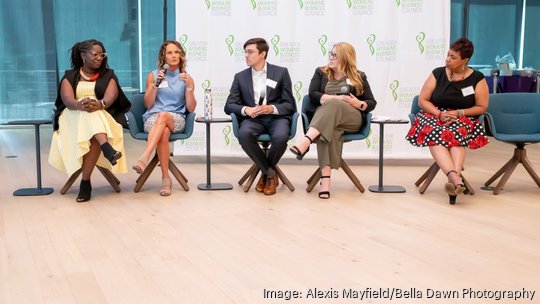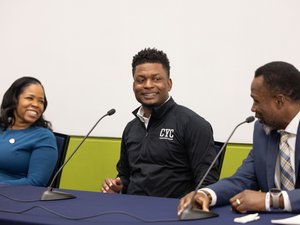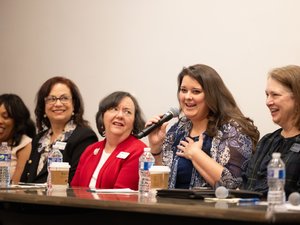
Small businesses not only generate nearly half of U.S. economic activity, but they're also a key element to the prosperity of large corporations.
Ally Financial Inc. (NYSE: ALLY) hosted a Greater Women's Business Council event June 26 in Charlotte on how small businesses can successfully partner with big companies. It brought together women entrepreneurs, business leaders, corporations and procurement professionals from across the Carolinas and Georgia to help them connect and achieve business goals.
Four leaders in the Charlotte community were asked to discuss a keynote address made during the event that dug into how to bridge the gap of accountability between small businesses and large corporations. It was presented by Tya Bolton, CLT Alliance Foundation's director of small business and entrepreneurship.
The four panelists included Clay Gotte, supplier diversity specialist at Charter Communications; Nicole Lipscomb, Ally's senior director of enterprise sourcing; Laura Smailes, assistant director of UNC Charlotte's Center for Entrepreneurship and Innovation; and Natalie Williams, chief operating officer at the Urban League of the Central Carolinas. Maria Balais, director of programs at nonprofit GWBC, moderated the conversation.
Below are main takeaways from the discussion.
What procurement officers look for in suppliers
Procurement officers are key players within an organization, responsible for assessing goods, services and suppliers, and negotiating contracts needed for business operations.
Bolton highlighted 12 factors that procurement officers consider in suppliers: quality; reliability; cost; sustainability; thorough market research; impact on operations; customized strategies and pitches; problem-solving skills; collaborative communication; mutually beneficial solutions; clear innovative ideas; and plans in compliance.
Lipscomb, who has a lengthy background in the supplier space, said each of those elements have an undertone of transparency, which is vital in the procurement process.
She told the audience that she often hears pitches that sound generic and can be repeated to multiple businesses across various industries. That can lead to suppliers being looked over.

"Some of the best pitches I've heard are those that are undertone in solid research about where Ally has been and where we are going," she said. "They're understanding who our leaders are and what's important to those leaders. That's really where things start to come together."
Gotte emphasized the importance of thorough market research. He said it's crucial that external vendors gather tailored information about a corporation and determine where they can be a solution.
"And when I go to procurement and I say, 'This person really understands our business and our hearts and where we're at and they offer a competitive and innovative solution,' all of these kind of come back to the thorough market research," Gotte said.
How small businesses can build quality relationships
Smailes said building relationships, not just networking, ties to what she calls customer discovery. She defines that as not only finding customers, but taking a deeper dive by asking open-ended questions.
Taking that extra step can lead to finding possible gaps and predicting any challenges or opportunities that could occur in the future.
"In relationship building, it's not just about the ask every time," Smailes said. "It's checking in. I don't want to talk to different partners or different people that I'm working with just because there's a need. So, it's really doing those deep dives that I feel we don't do enough."
Williams said she often speaks to small businesses about relationships and strategy.
"So when you're doing networking and you're building relationships, you have to make sure you understand why you're going where you're going," she added.
Leading with a value proposition is also key, Williams noted. That means when business owners meet with a potential partner, they should understand their bottom line and the benefit they can offer them.
Williams also pointed out that an entrepreneur's brand should always be represented in any networking room they enter.
"People do business with people they know, like and trust. Always remember that," she said. "Find out what they need, and then you build a relationship from there."








